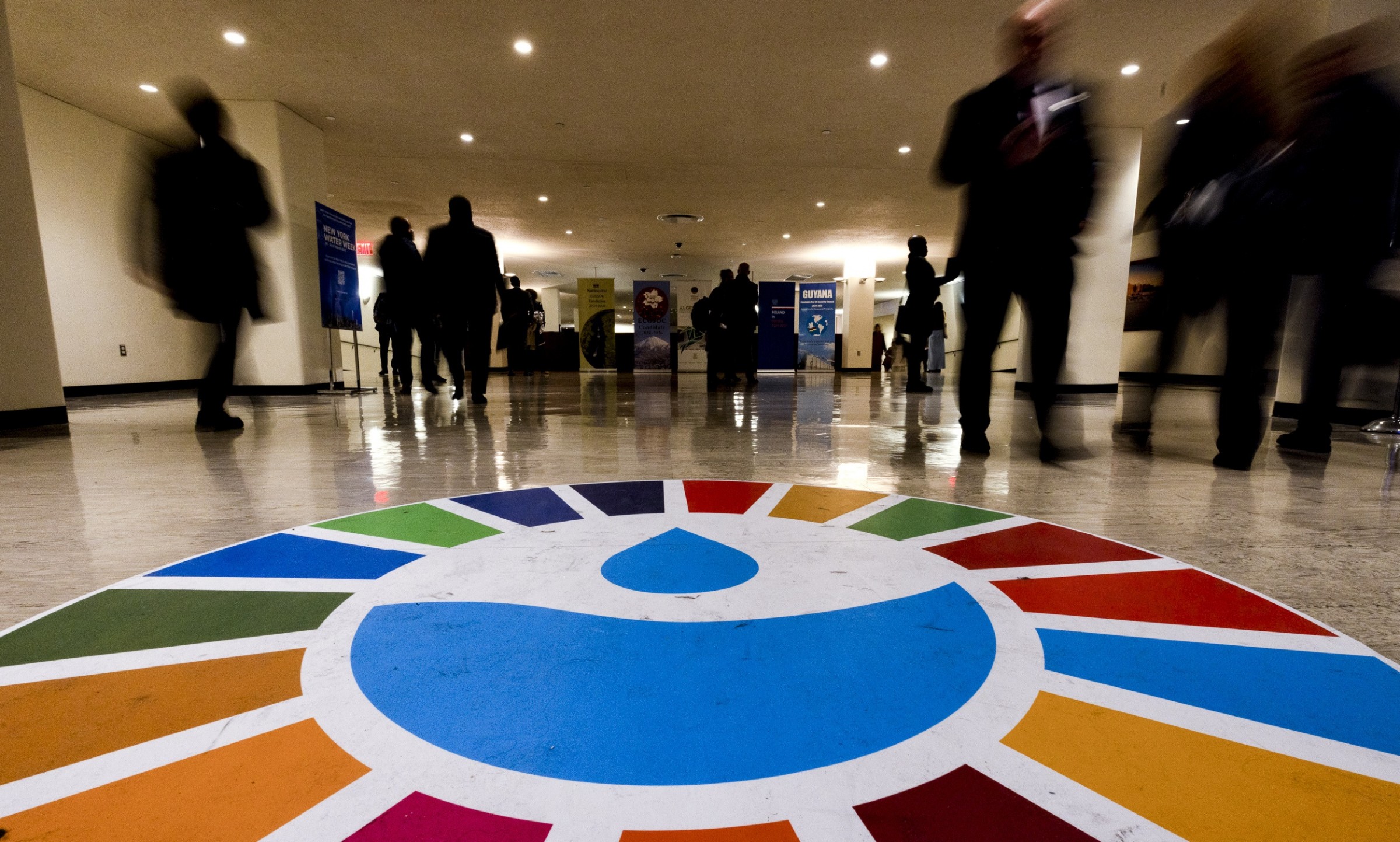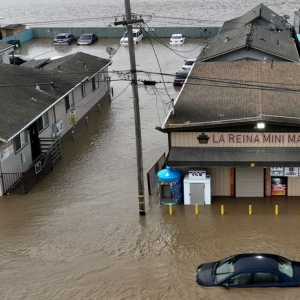Conference produces more than 700 commitments for water.

The UN Water Conference was held March 22-24, 2023, in New York City. Photo © J. Carl Ganter/Circle of Blue
By Brett Walton, Circle of Blue – March 31, 2023
What, in the end, did all the buzz accomplish?
To draw attention to ambitious global goals for water, sanitation, and ecosystems, the United Nations brought together people passionate about water for three days of panel discussions, speeches, commitments to action, and networking.
More than 10,500 people, virtually or in person, attended the first water conference convened by the UN in 46 years. The line to pick up security badges on the opening morning wrapped around Manhattan’s East 45th Street and down 2nd Avenue. Wait times, at peak, were upward of two and a half hours.
Inside the UN complex, crowds were just as prevalent. Sessions were so jammed that security guards had to turn people away from conference rooms.
An energetic, bustling atmosphere was partly the point. The conference functioned as a pep rally of sorts, a venue to muster support for a massive global effort that is far from being on track: safely managed water, sanitation, and ecosystems for all by 2030. The conference, however, was constrained by an agreement that no political declaration would be made. That meant the primary outcome would be voluntary commitments from participants.
The absence of binding pledges from governments was not the only limitation. Climate change negotiations take place under a UN framework called a convention. These conventions also exist for water-related topics — biodiversity, desertification, transboundary rivers and lakes — but not for water more broadly. Countries that are part of the conventions gather annually to debate issues, check progress, and propose changes. These conferences develop their own gravity, drawing in civil society groups, private sector, academia, and others.
This formal structure does not exist for water, which is far more fragmented. Talk about water and you’re often talking about agriculture, energy, municipal utilities, or fisheries. The water sector is isolated, says Scott Moore, a senior fellow at The Water Center at the University of Pennsylvania, who attended the conference. “It’s a small group of people that care deeply but are not well integrated.”
Even with the limitations, what was the conference’s substance?
The centerpiece is a list of voluntary commitments called the Water Action Agenda. So far, 713 commitments have been filed by NGOs, governments, businesses, universities, and intergovernmental organizations like UNICEF.
Many pledges were small in scale. Educational programs. A wastewater treatment expansion in Aruba. Rainwater retention in Korea’s mountains. Restoring 123,000 acres of peatlands in Kenya. The hope is that small actions add up.
A few big items are on the table. India pledged $50 billion to extend safe drinking water to all rural Indian households by 2030. Seventeen private sector businesses pledged $11 billion in research and development for water solutions over the next five years. Some ideas could be big, but are not yet fully developed. That includes a plan to find $30 billion a year for water investment in Africa and a goal to restore 300,000 kilometers of rivers by 2030. Will these initiatives bear fruit? Time will tell.
In these commitments and in sessions and side events, pressing topics were abundant — data gathering, political will, partnerships, conflict, corporate stewardship — but several major themes stood out.
One was the push for “nature-based solutions.” This is greenery like wetlands or intact floodplains that allows water to move beneficially across the land, causing less damage during floods and storing water for dry periods.
Another was the need for more inclusive management so that women and Indigenous peoples are not simply consulted about the fate of land and water, but are empowered as managers.
“You cannot protect the water without the guardians of the water,” said Hindou Oumarou Ibrahim, an advocate for Indigenous rights who is from the Mbororo pastoralist community in Chad.
A third area of focus was finance, or how to bring more money to the cause. The spending gap is “vast,” said Zac Goldsmith, the UK minister for overseas territories, commonwealth, energy, climate and environment. “We’ve got to get trillions moving across economies,” he said.
Simply adding more money to the pot and stirring is not enough, though. World Bank researchers presented data showing waste and inefficiency in the sector. Good governance was correlated with more effective spending.
“Getting more money into the sector is not going to solve all the woes,” Kathleen Dominique of the OECD said, in response to the research findings.
An undercurrent throughout the conference was the concept of value. In this view, cultural and social variables gain greater currency and water is at the center of major decisions. “This conference is beyond fixing the pipes,” said Henk Ovink, one of the leaders of the valuing water discussions and the Netherlands’ special envoy for international water affairs.
The world’s water challenges were never going to be resolved in three days. Reliable, safe water and sanitation and well-tended ecosystems are matters that require constant attention, especially the aspirational milestones in the SDGs.
The conference ended with a sense of momentum. Delegates voted to create the position of UN Special Envoy for Water, to facilitate these conversations within the UN system. And several counties, including Germany and Slovenia, called for regular high-level meetings on water, according to the Earth Negotiations Bulletin.
The work-left-to-do mood was reflected at a post-conference party in a warehouse music venue in Hell’s Kitchen. One speaker, using the earnest sloganeering that is common at these events, was concise: “Tonight we celebrate, tomorrow we accelerate.”
Brett writes about agriculture, energy, infrastructure, and the politics and economics of water in the United States. He also writes the Federal Water Tap, Circle of Blue’s weekly digest of U.S. government water news. He is the winner of two Society of Environmental Journalists reporting awards, one of the top honors in American environmental journalism: first place for explanatory reporting for a series on septic system pollution in the United States(2016) and third place for beat reporting in a small market (2014). He received the Sierra Club’s Distinguished Service Award in 2018. Brett lives in Seattle, where he hikes the mountains and bakes pies. Contact Brett Walton





